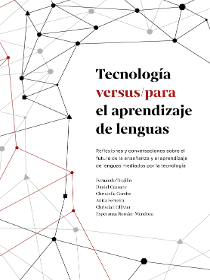Book Review Technology versus/for language learning. Reflections and conversations on the future of technology-mediated language teaching and learning
10.20420/ElGuiniguada.2024.733
Keywords:
Tecnología educativa, Aprendizaje de lenguas, innovación en la enseñanza, pedagogía digital, enseñanza mediada por tecnología, reseñaAbstract
Reseña crítica de la obra Tecnología versus/para el aprendizaje de lenguas. Reflexiones y conversaciones sobre el futuro de la enseñanza y el aprendizaje de lenguas mediados por la tecnología, de Fernando Trujillo-Sáez (coord.), Daniel Cassany, Cristelle Combe, Anita Ferreira, Christian Ollivier y Esperanza Román-Mendoza. Publicada en Difusión (2022).
Downloads
References
Trujillo-Sáez, F. (coord.); Cassany, D.; Combe, C.; Ferreira, A.; Ollivier, C.; Román-Mendoza, E. (2022). Tecnología versus/para el aprendizaje de lenguas. Reflexiones y conversaciones sobre el futuro de la enseñanza y el aprendizaje de lenguas mediados por la tecnología. Difusión.

Published
How to Cite
Issue
Section
License
Copyright (c) 2024 Juan Pedro Tacoronte Sosa

This work is licensed under a Creative Commons Attribution-NonCommercial-NoDerivatives 4.0 International License.
Authors who publish with this journal agree to the following terms:
- Authors retain copyright and grant the journal right of first publication with the work simultaneously licensed under a Creative Commons Attribution License that allows others to share the work with an acknowledgement of the work's authorship and initial publication in this journal. You can not make a commercial use of the work. The use derived from the work is also not allowed.
- Authors are able to enter into separate, additional contractual arrangements for the non-exclusive distribution of the journal's published version of the work (e.g., post it to an institutional repository or publish it in a book), with an acknowledgement of its initial publication in this journal.
- Authors are permitted and encouraged to post their work online (e.g., in institutional repositories or on their website) prior to and during the submission process, as it can lead to productive exchanges, as well as earlier and greater citation of published work (See The Effect of Open Access).















